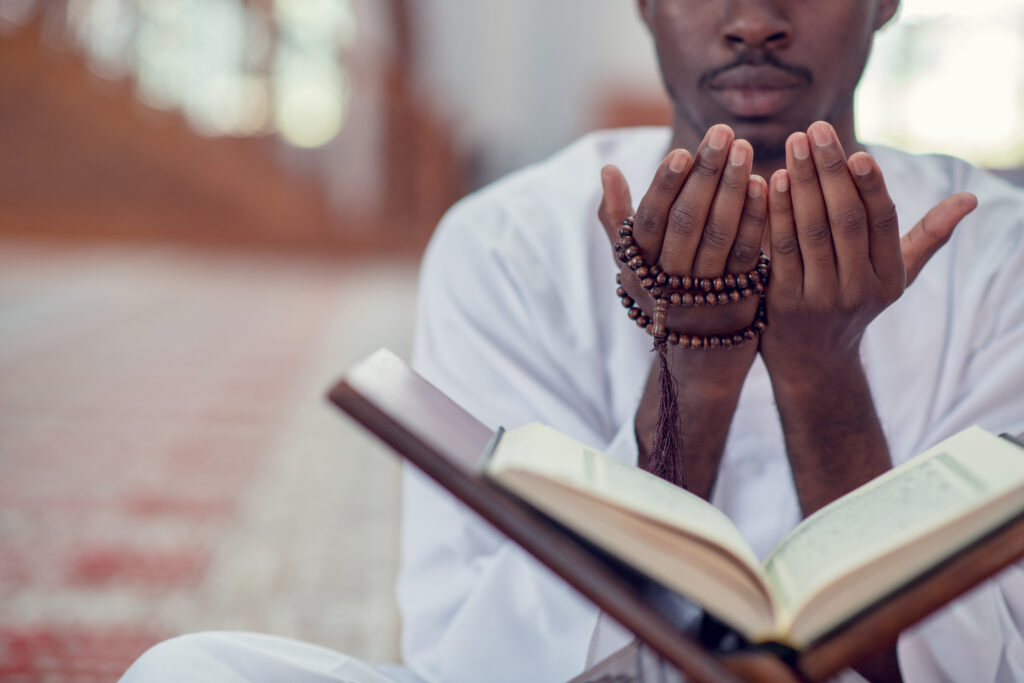Understanding what Quranic verses Al-Inshirah (94): 5-6

By Muqtedar Khan
September/October 2022
The theme of this issue and ISNA’s 59th Annual Convention is hope, resilience and faith. It is derived from 94:6, a promise of God, the most merciful and most benevolent, that indeed with hardship comes ease.
This article seeks to accomplish two goals: 1) to provide a commentary on 94:5-6, even though the theme is 94:6. Both are discussed, for if they are separated their meaning becomes distorted, and 2) to expand on how their message is guiding Muslims through a very difficult time.
While the world is suffering through the Covid-19 pandemic and its ramifications, the Russia-Ukraine war and the rise of authoritarianism, Muslims, especially those who live as minorities, must cope with the additional burden of Islamophobia. The ongoing war is causing hunger and food insecurity in many parts of the world. The pandemic has ended a million American lives — over 15 million worldwide — and disrupted economies and livelihoods. Physical and mental health issues continue to plague communities worldwide.
The war, the pandemic and bad governance are magnifying stress and suffering everywhere. Much of the world is in distress and despair. This promise of God is a beacon of hope that comforts the suffering, strengthens our resilience and resolve, makes us bear the ordeal with greater patience and empowers us to work harder to make things better.
The verses’ apparent meanings are a promise of hope in times of difficulty. The Quran reminds believers not to despair of God’s mercy (39:53) or lose hope in Him (12:87). His mercy indeed encompasses all (7:156). This powerful tonic helps the faithful bear the most difficult circumstances, and the promise of light at the end of the tunnel gives them the strength and resolve to move forward, no matter what. The last two years have been challenging and many speakers, khateebs and counselors have leaned on these verses to comfort and inspire their communities. I have personally used these verses to help community members. Many of them were non-Muslims; yet when I recited this promise to them, they were uplifted and experienced hope.
During April, I was at the London book fair for the relaunch of my book “Islam and Good Governance.” While there, I met a couple of refugees (who were in the book business) from Ukraine. We started talking about the devastation caused by the war. On listening to some of their stories, I shared these verses and 2:286 with them. I could sense from their reactions the feeling of hope these verses inspired.
We live by holding fast to the rope of God. This is the relationship of faith and hope, of promise and trust that we develop with the Quran. But sometimes the intellectual classes adopt an instrumentalist approach to the Quran. They have a message to deliver, and they look for support from the Quran to enhance its legitimacy and credibility. There’s nothing fundamentally wrong with this approach. It is for good, after all. But there is an etiquette toward the Quran that we must always maintain. Allah has commanded us to deliberate (tadabbur) upon it (4:82). Therefore, while we teach and benefit from its apparent meaning, we must also ponder upon its deeper meanings and seek the most beautiful understanding of God’s words, as commanded in 39:18.
In 65:7, while describing how a divorce should be handled compassionately, God promises ease after hardship and that the hardships one experiences will never exceed the capacity of one’s soul to bear it. It means that if God causes you to suffer, then He also gives you the capacity to suffer. This idea that one’s suffering will not be unbearable is also revealed in 2:286, a very special verse, one of the three gifts given to Prophet Muhammad (salla Allahu ‘alayhi was sallam) on the night of his mi‘raj. So, in a way this special verse promises that with suffering comes the capacity to bear that suffering. Those who are in pain and distress should do zikr and contemplate it.
Unlike 94:5-6, which speaks of ease with hardship, 65:7 speaks of ease after hardship. This distinction is critical. When one thinks of ease following hardship, then it’s easy to understand that the ease spoken of is essentially relief from the said hardship. But when the Quran speaks of ease with hardship, then we must ask ourselves how can ease co-exist with hardship?
This interpretive challenge becomes even more difficult when you look at the grammatical analysis advanced by some scholars of these two verses, which suggest that the Quran is not repeating itself but is actually saying that there are two eases that accompany one hardship. They make this argument since hardship is mentioned with a definite article al-usr and ease, yusr, is indefinite. They concluded that although the hardship is the same, the eases are different. This claim is also corroborated by a hadith narrated by Hasan al-Basri, who said that one day our dear Prophet(‘alayhi as salam): told his Companions that “one hardship cannot overcome two eases.” Commentators, classical and contemporary, maintain that this tradition spoke about 94:5-6.
So, then what are these two eases that accompany hardship? According to Quran commentator Sahl al-Tustari (818-96), they are the discernment of the heart (fitnat al-qalb) and the intellect (al-‘aql). Discernment of the heart here means its capacity to accept spiritual guidance and become the receptacle of God’s grace.
Thus hope (raja’a) is indeed inspired by these verses due to God’s grace and mercy. But they also are the two sources of agency that empower us to act to alleviate hardship. God has endowed all of us with the capacity to receive grace — the discernment of the heart — and we all have ‘aql (intelligence), which enables us to act with prudence in the face of adversity.
If we read the two verses in the context of sura 94, we notice that it starts with a reminder of how God expanded the Prophet’s chest. We can understand its meaning from the prayer of Moses (‘alayhi as salam): “My Lord, expand my chest, for me” (20:25). This concept explains the meaning of the two eases — discernment and reason — which made the burden of prophethood easy for our Prophet and for Moses.
So, when faced with adversity and hardship, we need not wait for the ease to come, for the two eases are with us already and we are empowered to act. We also have been granted vicegerency (khilafa; Quran 2:30), the agency to act.
Some readers may find these mystical and philosophical reflections difficult. But they are easy to comprehend when we consider real-life examples. When the pandemic was at its peak and country after country was resorting to lockdowns, how did we respond to this challenge? Our hearts never wavered from the truth, and we relied on our reason to innovate. We started Zoom khutbas and remote prayers, thereby breaking our habit of standing shoulder to shoulder while praying and practicing social distancing in our mosques.
We faced such challenges with our hearts and minds. We tried many ways to cope with economic and other hardships — often successfully. Our chemists and medical people created vaccines and new treatments and showed patience, perseverance and ingenuity, all from the blessings of God.
It may not be inaccurate to suggest that today Muslims are living in an age of suffering. Besides the pain from pandemics and war that everyone else is facing, Muslims have additional suffering. As minorities they suffer from religious oppression in places like China, India and occupied Palestine, and from Islamophobia in nations like Austria and France, to name but a few. In many Muslim-majority countries, they suffer from authoritarian governance, civil war, famines and extremism. Perhaps the idea of two eases, I hope, also implies ease for both, Muslims who live as minorities and Muslims who live in Muslim majority countries.
Muqtedar Khan, Ph.D. is a professor of Islamic studies and international relations at the University of Delaware. He is the author of the award-winning book “Islam and Good Governance: A Political Philosophy of Ihsan” (Palgrave, 2019). A former president of the Association of Muslim Social Scientists, he is the host of the YouTube show Khanversations. His personal website is www.ijtihad.org and he tweets @Muqtedarkhan.
What did you think about this article? Send comments and story pitches to horizons@isna.net. Islamic Horizons does not publish unsolicited material.
